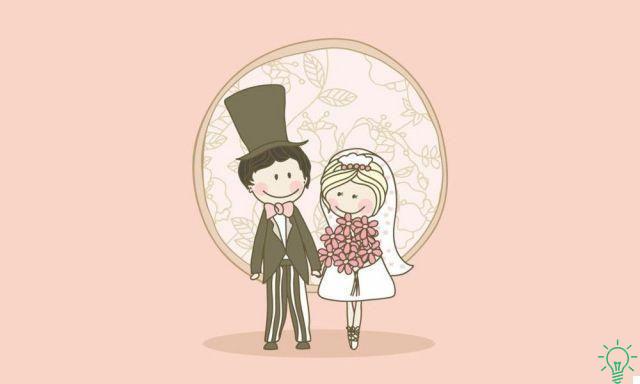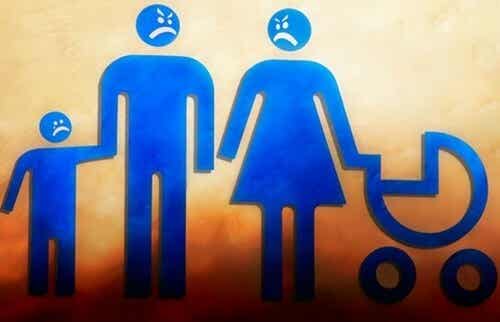If love hurts, it's not love. If the person who says they love us makes us feel bad, we should speak, act and react as soon as possible.

Last update: May 28, 2022
The bond with your loved one can sometimes take an unexpected turn and plunge into an uninterrupted cycle of criticism, humiliation or even mistreatment. If the relationship with your partner makes you feel bad, you have to react.
The most surprising aspect of these situations is that, on average, we are much more tolerant of emotional abuse than we think. To belittle, ridicule or insult does not leave marks on the skin and we tend to give in, lower our faces and justify what happened with "it's an isolated case, he had a bad day, he will change or I'll just have to make an effort to get treated better". Still, none of this works and the feeling of discomfort persists.
According to the study conducted at Case Western University in Cleveland (United States), between 50 and 80 percent of people could be emotionally abused at some point in their life. These situations are especially common in younger couples.
If the partner makes you feel bad, makes you feel uncomfortable or belittled in some respects, you have to react. They are nails that hurt with every step, wounds that get bigger and bigger and that we must deal with as soon as possible.
Does the partner hurt, why does it happen and what should I do?
It would be great to be able to choose how we feel regardless of what others do or not. However, in a relationship it is very difficult to remain indifferent. Love, commitment, expectations and more come into play.
How to behave as if nothing had happened when the person you love criticizes, makes you invisible or makes fun in front of others?
Sometimes it is not only impossible, but also devastating. Thus, when the partner hurts every other day, one is faced with a situation of psychological abuse.
It is also true that we can inadvertently cause some suffering to the other: we are all wrong. But be careful, because there is a clear difference with a reality of emotional or psychological abuse. In the first case there is a clear will to remedy.
When you disappoint or hurt your loved one in any way, you do everything you can to remedy the mistake and learn from what happened. The person engaging in psychological violence, on the other hand, will apologize, but will not change their attitude.
In the following lines we see, therefore, in detail what are the most common situations in which the partner makes one feel bad
He makes judgments without trying to understand
This is a fairly common dynamic. Sometimes, the partner can judge and pronounce statements such as "You are naive in these things", "You are exaggerated and you always take everything in the worst way".
We suffer when they start labeling us by making hasty judgments about what we say or do without understanding our position. What to do in these cases?
Nobody should be allowed to make hasty judgments about yourself, least of all about your partner. In reverse, demand respect, dialogue, speak assertively and make your position clear.
Those who judge without understanding the reality of others show not only a lack of empathy, but also a blatant lack of respect. It is a way to devalue your partner's beliefs, opinions, values and, in essence, the personality.
"I have no problem, it's you who don't understand me"
The partner makes you feel bad when your malaise manifests itself and, far from admitting it or taking responsibility for it, projects the sense of guilt onto the other. He will insist that it is the other person who does not understand and neglect the relationship.
The partner who uses the projection of guilt as a strategy tries above all to evade their responsibilities and to hurt the partner. He tries to make him feel bad, to invalidate him and, thus, to regain power.
We don't have to enter such a game, otherwise we will fall into the trap of psychological manipulation. Rather, it is necessary to specify the aspects that are not good, to clarify expectations and needs and how to improve the relationship. Finally, make it clear your limitations and what you are not willing to tolerate.
The partner hurts because he says what to do and not
In relationships based on emotional manipulation, it is common that one of the two seeks to exercise absolute control over the other. This means controlling the partner's conduct by remembering that certain attitudes cause unhappiness in the relationship.
The answer to these situations is clear: never give in. We cannot fail our person to the point of losing our identity, dignity and self-esteem. Maintaining a relationship should be synonymous with emotional growth and enrichment. If the partner dictates how to be and how to act, we get lost.
A study carried out at the University of Amsterdam (the Netherlands) indicates that this situation can be very dangerous in profiles with low self-esteem. These people end up making great sacrifices which they later regret.
Harmful Comments and Behavior
The use of irony that hurts, of indirect and daily contempt, damages dignity. Seeing how our partner ridicules us in public, launches sharp attacks on us to hurt us, causes us devastating suffering. The same goes for hurtful reactions like yelling, anger and, of course, insults.
Why would anyone make their partner feel bad?
We all have a bad day, we all go through stressful times. However, these situations cannot be a constant and perpetually affect the relationship. In the latter case, several reasons may converge:
- The partner has a problematic character: selfishness, narcissism, insecure attachment, low emotional intelligence, nastiness, etc.
- The relationship has a toxic dynamic: usually happens in unbalanced relationships right from the start. Therefore, it is possible for the partner to adopt a superior position where they enjoy more privileges.
- Personal matters: low self-esteem, fear of rejection or abandonment, need to please or poor ability to set limits.
There is no worse answer to these dynamics than doing nothing, telling yourself that it will change, that if we try to "be more accommodating" things will improve.
Be clear, if your partner hurts today, here and now, we need to tell them. If that behavior is repeated, we will ask for specific changes and a willingness to remedy.
If emotional assaults persist, a decision should be made. Let us remember that love is the most nourishing and healing emotion that exists. There is no room in it for suffering, tears and even less fear.


























